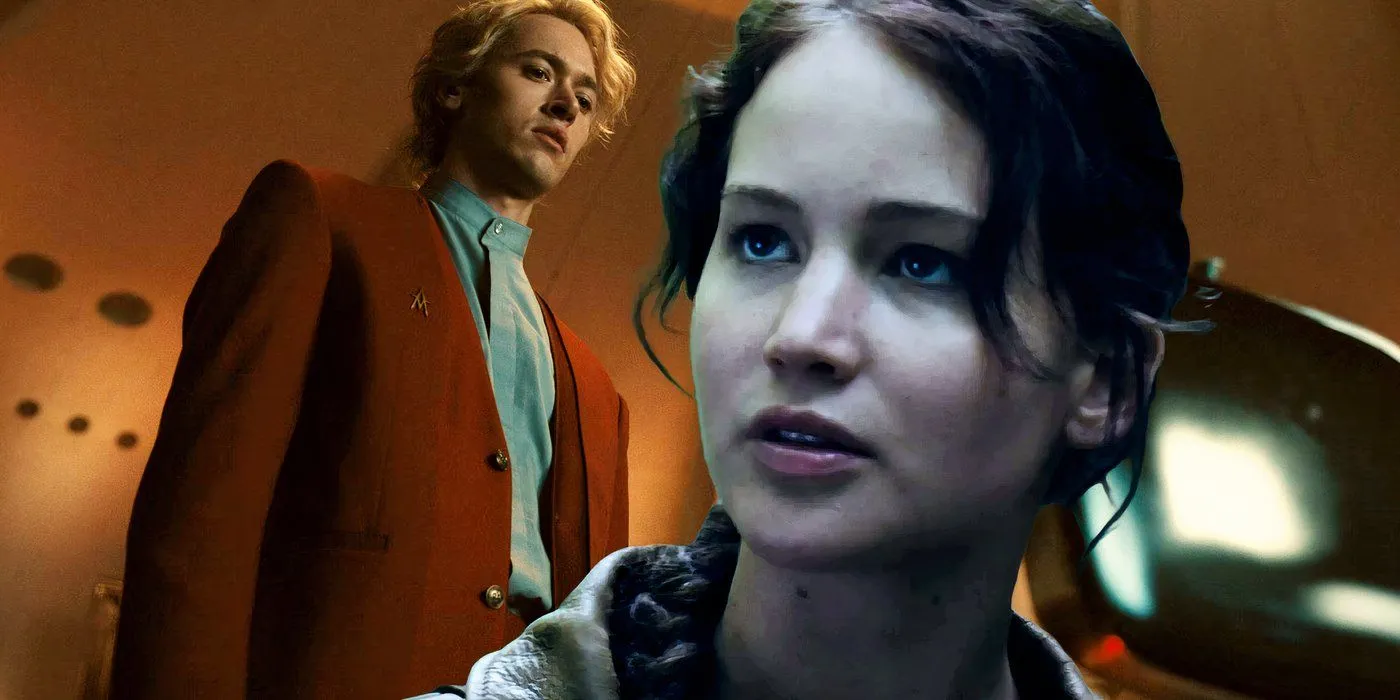The complex relationship between Coriolanus Snow and Tigris Snow deteriorates between the narratives of The Ballad of Songbirds and Snakes and The Hunger Games. The introduction of Tigris in Mockingjay depicts her as an ally to Katniss Everdeen. She appeared supportive of Katniss’s intentions to confront President Snow, which Katniss speculated was due to Tigris being dismissed from her duties as a stylist. However, the prequel, The Ballad of Songbirds and Snakes, unveils a deeper history between the cousins, revealing the multifaceted reasons behind their estrangement.
In this narrative, we learn that Tigris and Snow share a familial bond as cousins, raised much like siblings. Despite showing early signs of cruelty, young Coriolanus held a special affection for Tigris, who had taken on a nurturing role in his upbringing. Their bond was strong during their childhood, yet by the end of the prequel, there’s a noticeable shift. Though they initially maintained a cordial relationship, it’s strongly suggested that Snow’s treatment of Tigris deteriorated, mirroring the cruelty he exhibited toward others. This marked deterioration hints at a broader theme of love turning sour amidst power and ambition.
Tigris Represented Values Snow Couldn’t Assimilate After The Ballad of Songbirds and Snakes
Tigris Exemplifies Inherent Goodness



While Snow’s dark nature is apparent throughout The Ballad of Songbirds and Snakes, a significant transformation occurs by the story’s conclusion. After his relationship with Lucy Gray disintegrates, the teenage Coriolanus concludes that humanity is fundamentally evil. Struggling with his violent impulses, he reaches an alarming self-assessment of his own character, ultimately justifying his descent into malevolence by blaming the nature of humanity itself.
Snow grapples with the purpose behind the Hunger Games, concluding they serve as evidence of humanity’s innate wickedness, thereby justifying his authoritarian tendencies. Importantly, Tigris stands in stark contrast to this viewpoint. Her genuine goodness serves as a reminder of his humanity, posing a psychological threat to Snow’s belief system. To maintain his twisted narrative, he needs to suppress Tigris’s influence, ultimately leading to their fallout.
The Significance of Tigris and Snow’s Parallel Backgrounds in The Hunger Games
Dissimilar Outcomes from Similar Upbringings

In The Ballad of Songbirds and Snakes, Suzanne Collins masterfully illustrates the complexity of Tigris and Snow’s relationship, highlighting their shared history. Both suffered the trauma of losing their parents due to the Capitol’s war and were raised by the same politically loyal grandmother. They witnessed horrific events in their youth, including starvation and violence, which shaped their formative years. This potent mixture raised a crucial question: Why did Tigris emerge as a benevolent character while Snow transformed into a tyrant?
Collins crafts Tigris’s character as a testament to the nature-versus-nurture debate, demonstrating that although Snow’s environment influenced his tyrannical traits, his personal choices ultimately sculpted his identity. Tigris embodies kindness and compassion, traits that flourished despite their shared traumatic upbringing. Such contrasts echoed themes explored later through Katniss Everdeen’s journey, reinforcing the narrative’s exploration of human morality.
Tigris and Snow’s Divergence Mirrors Katniss’ Resolution in The Hunger Games
Finding Hope in Humanity: Katniss’s Journey

Similar to Snow’s internal confrontations regarding the darker facets of humanity outlined in The Ballad of Songbirds and Snakes, Katniss also grapples with humanity’s complexities throughout The Hunger Games. Initially, her focus revolves around survival, with little room for any broader moral contemplation. This perspective shifts dramatically when she volunteers to take her sister’s place in the Games.
Over the course of her trials, Katniss is continuously exposed to acts of kindness from others, especially Peeta, which catalyzes a change in her outlook. By the conclusion of her story, having seen vivid examples of human cruelty, she diverges from Snow’s path. Unlike him, Katniss deliberately chooses to acknowledge goodness amidst the darkness. Her coping mechanism involves recalling positive deeds witnessed throughout her journey, emphasizing a stability found in hope. This narrative arc reflects Collins’s emphasis on the transformative power of choosing to recognize humanity’s goodness, which resonates as the core theme of The Hunger Games.


